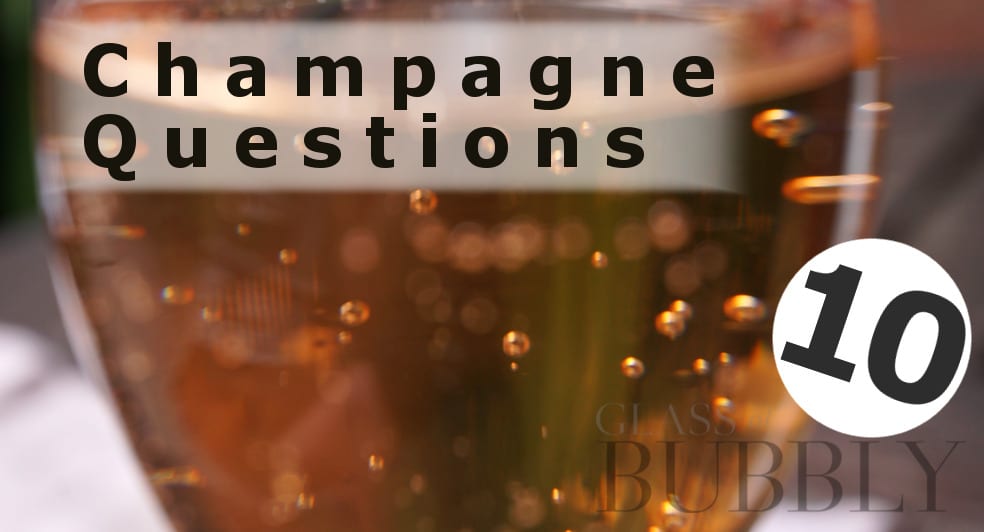10 Frequently Asked Questions about Champagne
6th November 2020

Did you know that approximately 300 million bottles of Champagne are sold each year with a sales value of around 5 billion euros. For sure the Champagne industry is a big one and it is a known wine to many households across the world. From iconic movies and celebrities to celebrations at sporting events, Champagne always likes to make an appearance.
What do we all know of Champagne though? It is a wine and it holds loads of bubbles and some will know that it is French, but beyond that can we really explain exactly what Champagne is?
Champagne is probably the most famous of wines and known sometimes as the wine of kings / king of wines. Below are some common questions that get asked of Champagne and the answers you need to know!
- Where is Champagne made? France and only in designated areas of Northern France. By law, this is a requirement and if you see Champagne from any other country it is not the real thing*.
- What grapes go into making Champagne? Most times it will be three main varieties which are Chardonnay, Pinot Noir and Pinot Meunier. A total of seven grape varieties are used with the other four being Arbane, Petit Meslier, Pinot Blanc and Pinot Gris.
- Why is Champagne so expensive? Champagne is produced via complex and time consuming method known as the méthode traditionelle. This requires the wine to have two fermentations and longer storage over many other sparkling wines. Climate for the Champagne region can also be challenging in order to produce the high quality of sparkling wine famed for this region. Also, Champagne has managed to get itself a position of being an aspirational product which also increases its brand value.
- Which is the best Champagne? The best known and respected brands are usually seen as Dom Pérignon, Louis Roederer and Krug. There is though no conclusive answers as wine is usually a personal thing to people and each years industry awards usually see different Champagnes winning titles / trophies.
- Is cheap Champagne any good? The answer to this more recently is yes. Larger supermarket chains, who usually sell cheaper Champagne priced or those with promotions, have stepped up their game when it comes to the wines they are buying and selling. Champagnes found at supermarkets and even those priced sometimes as low as £10 a bottle can still be very good examples that will please most people and give a decent representation of this famed fizzy drink.
- What is vintage Champagne? This will mean that the Champagne in question, with a year stated on the bottle, will be made from the grapes of the year only. Most times Champagne will not be vintage and will instead be non vintage (NV) which means they are made from the grapes of varied years. Vintage Champagne usually are better tasting and likely to cost more per bottle.
- How do they put the bubbles in Champagne? This is a natural process where the bubbles (carbon dioxide) are created during the second fermentation process where the yeast and sugar react together (yeast converts the sugar into alcohol and CO2). These bubbles are contained within the bottle so that when we open Champagne we get that pop sounds from release of pressure from the CO2 and more bubbles show when we pour. Eventually the Champagne will run out of CO2 the longer it is left out in the open.
- What is the best food to pair with Champagne? Today there are many menus that are designed to pair with Champagne and this ranges from fish and chips to creamy chicken. The most recognised and loved pairings include oysters, fish and chips, cheese boards, caviar, fried chicken and Macaroni cheese.
- Is Prosecco a Champagne? No. There are many different styles of sparkling wines including Cava, spumante, Lambrusco, Trentodoc and many more. Many people think a sparkling wine is automatically a Champagne – It is not as we spoke of in the first question. Prosecco is from Northern Italy and also made in a quicker production process which makes it usually a cheaper price point when purchasing.
- Does Champagne give you a headache or make you hasten drunkenness? Champagne is known for going to your head quicker than most alcoholic drinks. The main reason for this is due to the bubbles which are referenced as causing higher blood alcohol levels so that you also feel the effect of being drunk faster. Headaches are said to be caused by dehydration mostly along with mineral depletion / reactions to the sulphites in Champagne. Hangovers are also said to be worse from over indulging in Champagne the night before mostly due to the CO2 in your blood stream from the wine competing against the oxygen. Faster dizzyness being caused with usually a prolonged recovery time thus an exaggerated hangover along with dehydration in the morning.
![]()
Christopher Walkey
Co-founder of Glass of Bubbly. Journalist and author focused on Champagne & Sparkling Wines and pairing them with foods.
